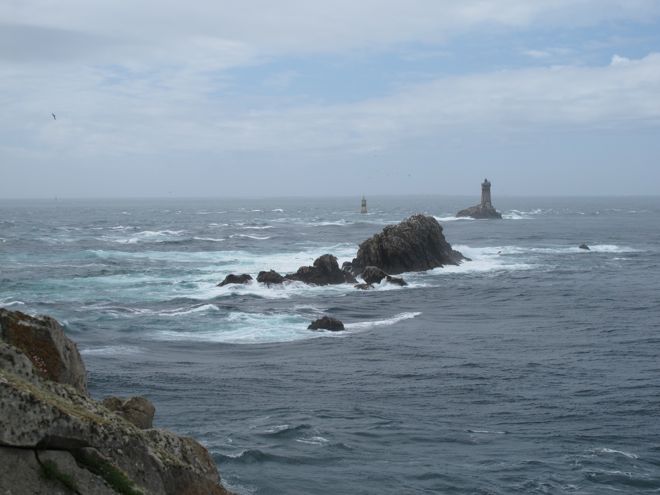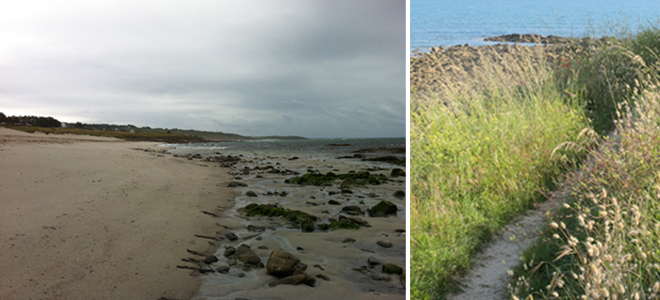

Back and forth, hither and yon – whether on my habitual trajectory between Touraine and Paris or further afield… destinations, encounters, events and observations I can’t resist sharing.

Just back from the department of Finistere on the southwest coast of Brittany. It’s a good thing the scenery is gorgeous because Brittany weather is consistently wet and windy. I did catch 2 sunny beach days at Pont-Aven one summer, but the sea was so cold it gave you a headache. If you thrive on the bracing coastal romance of Maine, Nova Scotia, west of Ireland and Scotland, then Finistere is for you.
The holy grail of windswept scenery is La Pointe du Raz, beyond the village of Plogoff – a rocky promontory notorious with sailors for intimidating waves and deadly currents. Tourists were kitted out in hiking sneakers and anoraks with a hood. It was far too blustery for an umbrella or a rain hat, unless tied tight under the chin (not a winning look even for babies).
Pointe du Raz is France’s Land’s End, and became a major tourist destination after Victor Hugo and Gustave Flaubert extolled its savage beauty. “Here is the end of the old world; behold its outer limit. Over your shoulders lie all of Europe and Asia; in front of you the ocean, the endlesss ocean.**” Technically Flaubert got it wrong, as there are two other Brittany outcroppings that extend a tad further into the Atlantic, but neither has comparably sublime scenery.
When crowds needed to be reined in at the risk of destroying the fragile ecosystem, Raz was designated a protected national park – one of France’s not-to-be-missed “Grand Sites”. Today’s pilgrimage is an orderly, didactic affair involving paid parking, a show-and-tell visitor’s center and jitney bus ride for the tired, infirm, lazy, or anyone who hopes to keep their hair looking good. On a clear day you can spy the low-lying island of Sein, just 5km offshore. Sein is a hardy fishing community with neither cars nor protected harbor, now threatened by rising sea levels. The sea was too rough for ferries to dock the day we were there.
Finistere is the cradle of Basse (or low) Brittany culture. Basse refers to the western half of Brittany, where most locals spoke only Breton before it was outlawed in 1902. An unofficial border has existed since the 14th century between the Basse and Gallo (French speaking) eastern half of Brittany. The Celtic language formerly spoken in the west, is now being revived in bilingual schools throughout the peninsula, and promoted through numerous cultural associations and institutions, yet a mere 5% of the population (206,000*) speak it fluently.

The profile of a typical Bretonnant speaker is a retired married woman with no educational degree living along the Finistere coast. Her husband was likely a fisherman, farmer or manual laborer and chances are that her children understand the language but don’t speak it. Ironically, the generation who speaks fluently is conflicted about Breton’s importance, as their parents (many of whom didn’t speak fluent French) were stigmatized as being primitive. What is now being taught in bilingual schools, and spoken on radio and TV, can be difficult for them to understand, as they speak more of a patois.
The statistical trend isn’t promising for a living language, with less than 2% of school children enrolled in bilingual school and just 3% of parents transmitting it at home. However, the reality of a language in decline hasn’t tarnished its stature as a symbol of regional pride.
We tuned into a Breton station for a few hours, and concluded that it’s unintelligible to French and English speakers. The only word I picked up was the German sounding “Ya” for yes. Breton most closely resembles Welsh, and like Wales, Bretons identify strongly with their traditions. Much of their identification is tied to a mythic past and heroic traits or stereotypes like rugged individualism and connection with nature.
Bretons describe themselves in the third person as independent characters that are stubborn, rebellious, hard working and sensitive. Having grown up in an Irish American family, I recognize the disconnect between talking the talk and walking the walk. If I’d proposed studying Gaelic instead of Latin or French, my parents would have told me to have my head examined. Speaking with a brogue was a stigma, just as having a Breton accent is tied to a lingering sense of inferiority among many elderly Bretonnants.
Unlike the Pays Basque, Brittany isn’t battling for autonomy or the sort of institutional independence Catalonia won in Spain. There’s a stronger sense of community here than in other regions of France, but also less xenophobia. Brittany voters have historically rejected the National Front party and tend to vote Socialist. While the rest of France considers the Brittany peninsula somewhat remote, Brittany has never perceived itself as isolated. The sea has always been its highway and its ports have welcomed visitors from Spain and the British Isles for centuries. It is closer to to England than Paris.

Plouhinec west of Quimper was our second Brittany filming destination. I tested Air BNB and found a modest three-bedroom house overlooking a sandy cove, down the road from the fishing port of Audierne. Stringent coastal zoning no longer permits construction close to the shoreline, but the owners of the house we rented are seeking permission to add on a needed second bathroom on the upper floor. With that addition, I would highly recommend it for two couples or a family with small children. The location, delightful view and price can’t be beat, and for those who enjoy cooking, the kitchen is well equipped. A Franco-British couple owns it and Sue the booking member of the couple and her trusty housekeeper couldn’t be more accommodating. Read More »
© Copyright 2024 Casey O’Brien Blondes - Privacy Policy | Design by Weller Smith Design
Do NOT follow this link or you will be banned from the site!